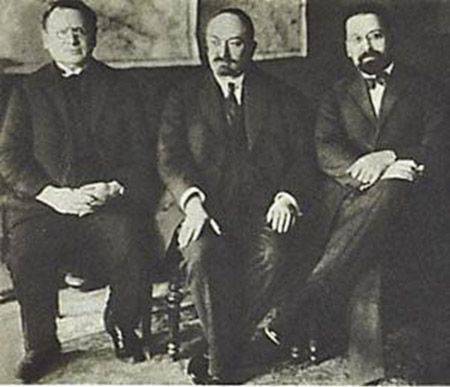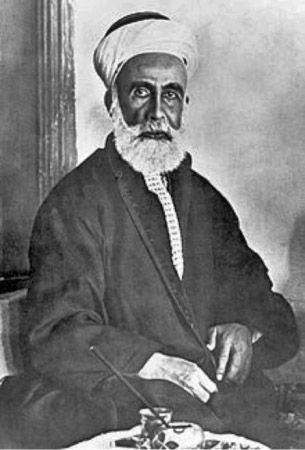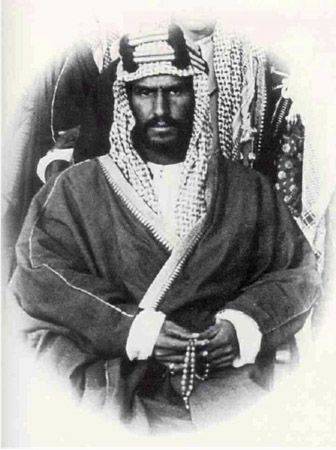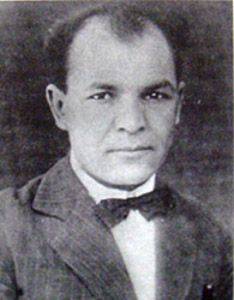The establishment of Soviet-Saudi diplomatic relations

During the work of the Lausanne Conference, the Soviet delegation, led by Chicherin, established direct contacts with the Arab delegates. Chicherin also informed Litvinov about his conversation with King Hijaz Hussein bin Ali al-Hashimi’s representative on January 30 in a letter dated 1923: “On the question of the Arab movement I had a meeting with the representative of Gejas at the Lausanne Conference Dr. Azil [9]. King Hussein instructed him to tell me that he is very well tuned in relation to the Russian Republic. The difficulty consists in the following: according to Dr. Azil, this difficulty is the same one that prevented Gejas from ratifying the Versailles Treaty. The fact is that Hussein does not want to be recognized as the king of Gejas. To agree to be recognized under this title is to agree to the entire English system of distribution of Arab countries, their mutual excitement and rejection of national unity. Hussein claims to stand at the head of the unifying national movement. The British negotiated with him in 1915 as the head of the entire Arab movement. He therefore wants to be recognized as the supreme head of all Arab countries, while maintaining their rulers in individual countries and creating a confederation out of them. I replied to this that we recognize something existing and cannot recognize a hypothetical government. We are very sympathetic to the unification of the Arab people, but we cannot interfere with the question of whether this unification is desirable in the form of a confederation under the rule of Hussein or in any other form, this is the business of the Arab people themselves ”[10].

At a meeting of the Politburo of December 29 1923 (Minutes No. 58), it was decided to “recognize as desirable an exchange of representatives with Gejas” [11].
Negotiations on the establishment of official relations between the USSR and the Hijaz were held for about one and a half years. The reason for such lengthy negotiations is the lack of regular direct contacts. Coordination of diplomatic steps between the parties was carried out in Rome, where the USSR embassy was located.
During the negotiations, the parties reached an agreement on the exchange of official representatives, and the Soviet Union was supposed to be represented by the agency and the consulate general, and Hijaz by the mission [12].
“The position of Sheriff [13] Hussein was due to his resentment against the British and the desire to show London that he could find other allies that could threaten British interests” [14]. This is the statement of the Russian researcher V.V. Naumkina indisputable. However, here: “Given Hussein’s negative attitude towards the October Revolution, one can hardly assume that he was planning an alliance with Moscow for a long time.” We see that there is no reason to talk about any allied relations in the full sense here. It was a temporary friendship against Britain, and nothing more.
With the abolition of the caliphate in Turkey 1924 title "Caliph" remained vacant. 6 March 1924. King Hussein proclaimed himself caliph, confirming his claim to leadership in the Arab world. Despite the fact that the Muslim East did not recognize him as such, it also caused concern to the British, who understood that King Hussein was getting out of their control, and his steps were becoming dangerous for their domination in the Middle East. “Hussein’s general policy aimed at breaking up and weakening Nejd, his claims for hegemony on the Arabian Peninsula, proclaiming himself a caliph, as well as his economic policy, prohibiting any import from Nejd, imposing exorbitant duties on goods exported to central Arabia, prohibiting Wahhabis [X. ] “Hajj” - all this inevitably led to a conflict between Gedjas and Nejd ”[15] and, ultimately, determined the fate of Hussein [16]. It is noteworthy that Chicherin considered the exchange of missions between Hejaz and the Soviet Union to be one of the main reasons for the change in British attitudes towards Hussein: “It is possible that our exchange of missions with Hedgeas [17] was the decisive moment in the change of British policy regarding Hussein. The Hijaz side was clearly ahead of the events when Foreign Minister Fuad Al-Khatib sent Chicherin a telegram received by 18 in March 17 on the fact that King Hijaz assumed the title “Caliph”. In the return telegram from 1924 in March 24, Mr. Chicherin only expressed regret, “that the absence of official relations hitherto hinders normal relations between our Governments”. No recognition of King Hussein’s title “Caliph”, and even less about his congratulations on this subject, was mentioned [1924]. In view of this, one can clarify the idea of V.V. Naumkin that “pushed by the British in order to prevent the realization of the concept of a pan-Arab state, the idea of a caliphate was seen by the Soviet leadership as hostile to the interests of Russia and its potential allies in the East” [19]. The British began to exploit the “idea of the caliphate” when one rebellious Arab ruler was eliminated - King Hussein, and began to resign from the other - Emir Ibn Saud [20], a potential leader of the Arab world. In support of this, one can cite Chicherin, first as unverified information that “the British support the movement in Egypt in favor of declaring King Fuad the Caliph” [21] (a letter to the Consul General in Hejaz to 22 in November 23) ), and later, after the Cairo Muslim Congress, on countering the “caliphate intrigues of our antagonists” [14] (letter to the plenipotentiary in Turkey Ya.Z. Suritz from October 1924 from 24).

3 April 1924 Chicherin in a letter to the plenipotentiary of the USSR in Italy K.K. Yurenevu informed about the decision taken in Moscow to appoint K.A., Consul General of the USSR in Hejaz. Khakimov. Chicherin wrote about this: “The decision to enter into diplomatic relations with Gejas was made by the most authoritative institution [25] even when I was in Lausanne ... This resolution was executed ... In Gejas, the USSR, like all other states, will have Consul General, and Gojas will have a messenger in Moscow ... It is of utmost importance for us to go to Mecca. It is precisely for this reason that we appoint the Muslim Consul General to be in Mecca. Meanwhile, besides comrade Khakimov, there were no other suitable Muslims, although we searched for a very long time. Some defects in Comrade Khakimov exist, but in other possible candidates the defects are incomparably more significant. Tov. Khakimov was already accustomed to our politics, as he had held posts for many years. We decided that in the near future, t. Khakimov would leave from here to Gejas. Entering into relations with King Hussein does not mean at all that we are ready to recognize him as caliph. Our government has nothing to do with church organizations and ignores the existence of such institutions as the caliphate ”[26].

In the following telegraph to Chicherin, received on April 24, al-Khatib stressed, “that our correspondence with you through our envoy in Rome proved our great desire to establish official relations that are important. We await the arrival of your own representative, appointed at your discretion ”[27]. On the same day, the Chairman of the Central Executive Committee of the USSR M.I. Kalinin signed the credentials of a diplomatic agent [28] and USSR Consul General in Hejaz K.A. Khakimov [29].
On August 6, Khakimov, together with the staff of the consulate general, arrived in Jeddah and sent a telegram to Mecca addressed to the king [30]. The Soviet representative as a Muslim was allowed to present his credentials to King Hussein in Mecca, which he did on August 9 1924. [31] This irritated British diplomacy. [32] The USSR Agency in Jeddah became the first official representative of the Soviet Union in Arab countries.
3 in October 1924 arrived in Moscow with a Hashemite mission as part of the envoy extraordinary and minister plenipotentiary Hejaz Habib Lutfullah, mission secretary of Bustras and military attache Tahir Bey [33].
The information about the significance the Soviet government attached to this embassy, reports V.V. Naumkin: “The reception given to the Emir testified to the seriousness of the intentions of the Soviet leadership to develop relations with the Hejaz sheriff (Hussein. - PG). The emir was received by the chairman of the CEC, Mikhail Kalinin. He was placed in the Savoy Hotel in the center of Moscow. Referring to the hospitality rendered to the Russian mission in the Hijaz, Lutfalla not only did not pay for hotel accommodation, but also delayed the payment of restaurant bills. It was decided not to demand payment for the stay of the Hejaz envoy ”[34].
In September, 1924 Mr. Ibn Saud, without fear of intervention by Britain, launched a war with Hejaz in order to unite most of Arabia under his rule. In this regard, Chicherin, in a letter from 14 in November, 1924 set the following task for Khakimov: "... while maintaining friendly relations with Gejas ..., do not miss the opportunity to get in touch with the new power of Arabia - Ibn Saud ... Since the international position and our obligations towards England dictates to us to avoid such steps, which could be interpreted as our direct action against England, all your endeavors for expanding communications in Arabia should be structured so that they cannot see the elements of anti-British agitation. Our interests in the Arab issue boil down to uniting the Arab lands into one state unit. If Ibn Saud pursues a policy of uniting the Arabs, this will be in our interests, and we will also have to try to get close to him, as we did with Hussein, who tried to unite Arabia ”[35].
The situation provoked by Great Britain went out of its control: hoping only to displace Hussein with Ibn Saud’s hands, the British, as a result of the Nedzhdi-Hejaz war, obtained a leader in Arabia capable of creating a strong state that could go against the interests of the United Kingdom. Chicherin 14, in correspondence with Khakimov on November 1924, concluded: “The complaints of the English press and the French gloating about the difficult circumstances that were created for England in the Arabian Peninsula say that the situation there has changed far from in favor of the British. The old equilibrium system, so hard built by the British, is destroyed. ”[36].
The reasons for the “gloating” of France are most succinctly conveyed by the Soviet historian Gurko-Kryazhin: “France, having buried ... its dream of hegemony in Europe, facing an inevitable financial collapse, is no longer able to carry out the former broad imperial program in the East. Already the Lausanne Conference was the Middle East Austerylite for France. All the stages of the “martyrdom” of French imperialism in Europe — at the London Reparation Conference and in Locarno — are reflected immediately in the East. Without a shadow of protest, France is present during the destruction of the Anglo-Egyptian condominium in Sudan and the transformation of the latter into an ordinary English colony, she obstinately observes the cynical seizure ... of the port of Aqaba and Ma'an from Gejas and their transfer to the British vassal state of Transjordan; in the League of Nations, France is forced to fully support the demands of England to transfer Mosul to her ... ”[37] We, however, see that French“ gloating ”is rooted in the colonial rivalry of Paris and London, which led to the Fashoda crisis in 1898, for the resolution of which France was forced to give up [38].
Let's go back to the Hijaz. 5 December 1924 Ibn Saud troops entered Mecca. The position of Khakimov, accredited to the enemy Ibn Saud, has become quite difficult. Chicherin understood this well. In his instruction sent to 17 in March 1925 by Khakimov, he wrote: “As a loved one, it seems that by the end of the Hejas events we need, first of all, to build our tactics so as to keep our agency and consulate in the“ holy land ”[39] . If Jeddah is not taken by the Wahhabis, we will have to continue playing the role of Hashimite friends and maintain diplomatic relations with the Gedzhas government ... If events turn differently and Wahhabis take Jeddah and drive them out of the “holy land” of the Hashimites, then we will have to arrange your stay in Gedzhas on A new title ... Every opportunity to stay and keep, thus, the base in Arabia must, of course, be taken into account and used by you ”[40].
In the same letter, in connection with the situation around Ibn Saud, Chicherin essentially draws an algorithm for the actions of Soviet diplomacy in the East: “... On the one hand, we must emphasize in every way our common friendship with the peoples of the East and the principle of self-determination of peoples that underlies our policy one must be extremely careful about England. No need to give food for any new English ultimatum [41]. Ibn Saud is on the salary of England, and if today he is in a quarrel with her, then there is no guarantee that tomorrow he will not reconcile with her and will not become just an English agent. Under such conditions, excessive frankness is unacceptable. We can say in a very general way that our sympathy for self-determined and struggling for independence nations means that we are against all kinds of invasions, invasions, conquests and oppression of less powerful nations by great powers. But we should not sharpen these conversations specifically against England, so that we do not get a diplomatic scandal. We should illustrate the thesis of our friendly relations with the peoples of the East, talking about our friendship with Turkey, Persia, Afghanistan, etc., but it should be extremely careful about England. Any desire of the Eastern peoples for independence can count on our sympathy ”[42].
Not only the USSR held a wait and see attitude in the Hijaz-Nedjid conflict. So, Italy “supplied weapon and supplies to both belligerents, and recently her sympathies were clearly leaning towards Ibn Saud, as a larger buyer ”[43].
Following Chicherin's instructions, Khakimov in April 1925, that is, during the siege of Jeddah by the Nejdis, died [44] to Mecca, where he managed to meet with Ibn Saud. During this meeting, he was able to negotiate negotiations between the warring parties in Mecca, held 30 Ramadan 1343, the year of the hijra [45]. Khakimov, acting as an intermediary, could rely on the special disposition of the future King of Saudi Arabia, if not his rashness: after publishing a report on the mediation of Khakimov in the Umm al-Kura newspaper, he demanded Ibn Saud in his letter to refute this message. Ibn Saud expressed his bewilderment about this and refused to comply with the requirement of Khakimov [46].
Khakimov and Chicherin did not approve of July 19 in a letter dated 1925: “It was hardly advisable to come forward with a refutation of your role as a peaceful mediator. Saudi officialdom (“Umm al-Kura.” - PG) in this respect did not single out you from the other consuls and did not specifically assign you the role of mediator, but to consuls in general. At the same time, on the basis of your own words [Ibn] Saud was entitled to consider you as one of the mediators. Your denial surprised him, and perhaps even irritated him a little ”[47].
At the same time, Chicherin highly appreciated the results of the meeting between Khakimov and Ibn Saud. “The trip to Mecca, so well organized and carried out by you, greatly enriched our information about the actual situation of Ibn Saud and his intentions. From the point of view of establishing some contact with Saud, this trip also gave a good result ”[48].
In the same letter, Chicherin set new, broader tasks for the agency in Arabia: “The prospects of Arab-Turkish cooperation ... we are very interested, and we would very much like to receive from you as much information as possible both on this issue and on the question of the attitude of Saud and other Arab leaders and countries to the upcoming regular diplomatic battle over Mossul between England and Turkey. We are especially interested in the question of whether through our employees in Eritrea, our employees can contact Abyssinia [49] and probe the ground unofficially, as the Abyssinian government would treat the question of resuming relations and sending our agent to this country ”[50].
Adapting to new political realities, the British in October 1925 sent Colonel Clayton to Ibn Saud, in negotiations with whom "Ibn Saud again showed himself a flexible politician, agreeing to concessions ... instead of the actual recognition of the annexation of Hejaz by the UK [51].
Ibn Saud won a complete victory in the war with Hejaz. “December 21 1925 The English cruiser took away the king of King Ali Alij, to the expulsion, just as a few months before that another cruiser had taken away his father, ex-King Hussein ...” [52].
6 December 1925 Ibn Saud’s troops occupied Medina, and December 23 Jiddu. In February, 1926 took over the title of “King of Hejaz, Sultan of Nejd and the annexed regions”, establishing the state that after Ibn Saud assumed the corresponding title in January of 1927 became the Kingdom of Hejaz, Nejd and the annexed regions, and since September 1932. - Kingdom of Saudi Arabia.
After Jeddah was occupied by the Nejdis, Ibn Saud in a letter to Khakimov expressed gratitude to the USSR government for maintaining neutrality during the war [53].
16 February 1926. The Soviet Union was the first to recognize the new state in the Arabian Peninsula. On this day, Khakimov risked his life, personally driving a car with a Soviet flag on the hood, managed under shelling to overcome the distance from Jeddah to Ibn Saud camp through the desert and hand him an official note that said: “The Government of the USSR, based on the principle of self-determination of peoples ... recognizes you as the king of Gejas, the Sultan of Nejd and the annexed regions. Because of this, the Soviet government considers itself in a state of normal diplomatic relations with Your Majesty’s Government. " In a response note from 19 February, Ibn Saud expressed his “full readiness for relations with the government of the USSR and its citizens, which are inherent in friendly powers” [54]. Thus, Soviet-Saudi diplomatic relations were established.
The position of the USSR government, the first to recognize the state of Ibn Saud, was important for strengthening the international position of Saudi Arabia. As Khakimov reported to Moscow, Soviet recognition prompted Britain and other powers to recognize Ibn Saud too. “The recognition of England, which was rather hasty, can even be considered forced” [55].
Notes
[1] USSR and Arab countries. 1917-1960. M., 1961, p. 797.
[2] Modern transcription - Jeddah.
[3] A consulate of the Russian Empire operated in 1890 in Jeddah. See: P. Gusterin. Diplomatic missions and consular offices of the Russian Empire on the territory of modern Arab states // Jerusalem Journal. 2014, No. V-VI.
[4] At that time, Mecca is the political capital of Hejaz.
[5] Modern transcription - Hejaz. In reality, Jeddah was the diplomatic capital of Hejaz.
[6] See: Gusterin P. Soviet policy in the Muslim East in 1917-1921 // Questions stories. 2010, No. 1; Gusterin P. On the contacts of Muslims of the USSR with Muslims abroad in 1920-ies // Islam and the state in Russia: Collection of materials of the International Scientific and Practical Conference dedicated to the 225 anniversary of the Central Spiritual Administration of Muslims of Russia - Orenburg Mohammedan Spiritual Assembly. Ufa, 2013.
[7] G.V. Chicherin and the Arab East // Bulletin of the Ministry of Foreign Affairs of the USSR. 1990, No. 21, p. 37.
[8] RGASPI. F. 17, op. 3, d. 328, l. 5.
[9] Naji al-Asyl from the Hashimite dynasty.
[10] Documents of the USSR foreign policy. T. VI, p. 170.
[11] RGASPI. F. 17, op. 3, d. 406, l. 3.
[12] USSR and Arab countries, p. 797.
[13] Here: the ruler of Mecca.
[14] Naumkin V.V. Soviet diplomacy in Hejaz: the first breakthrough in Arabia. - In the book: Arab countries of West Asia and North Africa (recent history, economics and politics). M., 1997, p. 276.
[15] Ie to non-members.
[16] Axelrod M. Fight for Arabia // International life. 1926, No. 3, p. 61.
[17] The latest history of the Arab countries of Asia. M., 1988, p. 341-342.
[18] G.V. Chicherin and the Arab East, p. 39.
[19] Documents of the USSR foreign policy. T. VII, p. 162.
[20] Naumkin V.V. Soviet diplomacy in Hejaz ..., p. 274.
[21] Full name - Abd-al-Aziz bin Abd-ar-Rahman bin Faisal (reigned in 1902-1953).
[22] G.V. Chicherin and the Arab East, p. 40.
[23] See: Gusterin P. In memory of Karim Khakimov - diplomat and scientist // Diplomatic service. 2008, No. 1.
[24] G.V. Chicherin and the Arab East, p. 45.
[25] It's about the Politburo.
[26] G.V. Chicherin and the Arab East, p. 38.
[27] Documents of the USSR foreign policy. T. VII, p. 162.
[28] Under the “Vienna Regulations” 1815, i.e. prior to the Vienna Convention on Diplomatic Relations 1961, only the head of diplomatic representation was called a diplomatic agent.
[29] USSR and Arab countries, p. 60.
[30] AVPRF. F. 190, op. 2, p. 1, d. 2, l. 96.
[31] Documents of the USSR foreign policy. T. VII, p. 707.
[32] Vasiliev A.M. History of Saudi Arabia. M., 1982, p. 290.
[33] “News” of October 3 1924
[34]Naumkin V.V. Soviet diplomacy in Hejaz ..., p. 275.
[35] G.V. Chicherin and the Arab East, p. 43.
[36] Ibid., P. 39.
[37] Gurko-Kryazhin V.A. Arab East and imperialism. M., 1926, p. 20-21. Cm.: Gusterin P. Soviet-Egyptian relations in 1920-1930-ies // Questions of history. 2013, No. 3.
[38] See: History of Diplomacy. T. II. M., 1963, p. 421-441; Rotshtein, F.A. International relations at the end of the XIX century. M. — L., 1960, p. 516-533.
[39] Traditionally, “Holy Land” is called Palestine, but here we are talking about the Hejaz, where the main Muslim shrines are located - the Kaaba in Mecca and the Prophet's Mosque in Medina.
[40] G.V. Chicherin and the Arab East, p. 40-41.
[41] This is an 1923 “Curzon ultimatum” of the year. Cm.: Gusterin P. Soviet-British relations between the world wars. Saarbrücken, 2014, p. 22.
[42] G.V. Chicherin and the Arab East, p. 42-43. Cm.: Gusterin P. Soviet diplomacy in the Muslim East in 1917-1921. Saarbrücken, 2014.
[43] Axelrod M. Fight for Arabia, p. 64.
[44] Umrah - a small pilgrimage.
[45] 24 April 1925
[46] Naumkin V.V. Soviet diplomacy in Hejaz ..., p. 282.
[47] G.V. Chicherin and the Arab East, p. 42-43.
[48] Ibid., P. 43.
[49] Abyssinia is the obsolete name for Ethiopia.
[50] G.V. Chicherin and the Arab East, p. 44.
[51] Recent History of the Arab Countries of Asia, p. 342.
[52] Axelrod M. Fight for Arabia, p. 59.
[53] Documents of the USSR foreign policy. T. IX, c. 671.
[54] USSR and Arab countries, p. 61-62.
[55] Documents of the USSR foreign policy. T. X, c. 134.
Information